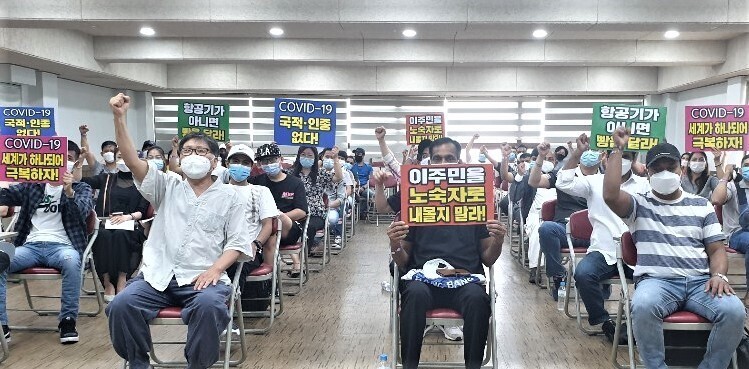hankyoreh
Links to other country sites 다른 나라 사이트 링크
Migrant workers stranded in S. Korea due to lack of flights amid COVID-19 pandemic

In 2018, eight singers from the Philippines arrived in South Korea on E-6 (arts and entertainment) visas to work at hotel nightclubs in Seoul, Incheon, and Changwon, South Gyeongsang Province. Because of the COVID-19 pandemic, however, all of them have been out of work as all nightclubs have been shut down. They had intended to return to the Philippines, but the cancellation of flights due to the pandemic has prevented them from returning, leaving them to weather the situation in South Korea.
A migrant worker from Nepal who arrived in South Korea in July 2015 through an E-9 non-professional employment visa worked at an automobile parts company in Gimhae, South Gyeongsang Province, before his sojourn period expired in May 2020 and he had to leave the job. But with flights to Nepal suspended because of the pandemic, he has been waiting at the company’s dormitory for the last two months.
Seven people from Kiribati arrived in South Korea in April 2019 on D-4 training visas and worked at a Busan seafood processing company for a year until April 2020. Now that their contract period is over, they are supposed to return home. But with no flights available, they have been left to wait indefinitely at the company’s dormitory.
Thousands of migrant workers in South Korea have been left stranded as flights have been cancelled due to the novel coronavirus pandemic.
On July 16, South Gyeongsang Migrant Solidarity, a group with members from the South Gyeongsang Migrants Community Center and migrant national associations in 14 countries, called for measures to be developed in response.
“Migrant workers have faced double- and triple-whammy difficulties, having lost their jobs en masse and then being unable to return home because there are no flights,” the group said.
According to accounts from the associations in question, while over 30,000 people return home each year after their sojourn periods expire, the number of migrant workers who have been unable to return after the end of their sojourn because of flight suspensions is estimated to have already exceeded 5,000.
Those who do not return to their home country within 50 days of the expiration of their sojourn period are regarded as illegal residents. But as the novel coronavirus pandemic drags on, more and more people are becoming illegal aliens. The Korea Immigration Service under the Ministry of Justice is responsible for locating and deporting illegal residents -- but because of the pandemic, the lack of airline service means that even illegal aliens who are located cannot be deported.
At the same time, it remains illegal to employ migrant workers whose sojourn period has expired. This has left migrant workers whose sojourns have expired in a position where they have no employment and have to exhaust the funds they earned in South Korea as they await the opportunity to return home. In some cases, migrant workers have been evicted from the dormitories of their former employers and left to sleep on the streets after their money has run out.
“The South Korean government needs to take measures, including holding proactive discussions with different embassies in South Korea to ensure that flights are available for migrant workers to return home, while granting special sojourn status that allows them to work temporarily until their return,” said Lee Cheol-seung, representative of the Gyeongnam Migrants Community Service Center.
“We look forward to local governments following Seoul’s lead in providing basic disaster allowances to migrants in crisis,” Lee said.
By Choi Sang-won, South Gyeongsang correspondent
Please direct comments or questions to [english@hani.co.kr]

Editorial・opinion
![[Editorial] Penalties for airing allegations against Korea’s first lady endanger free press [Editorial] Penalties for airing allegations against Korea’s first lady endanger free press](https://flexible.img.hani.co.kr/flexible/normal/500/300/imgdb/original/2024/0502/1817146398095106.jpg) [Editorial] Penalties for airing allegations against Korea’s first lady endanger free press
[Editorial] Penalties for airing allegations against Korea’s first lady endanger free press![[Editorial] Yoon must halt procurement of SM-3 interceptor missiles [Editorial] Yoon must halt procurement of SM-3 interceptor missiles](https://flexible.img.hani.co.kr/flexible/normal/500/300/imgdb/child/2024/0501/17145495551605_1717145495195344.jpg) [Editorial] Yoon must halt procurement of SM-3 interceptor missiles
[Editorial] Yoon must halt procurement of SM-3 interceptor missiles- [Guest essay] Maybe Korea’s rapid population decline is an opportunity, not a crisis
- [Column] Can Yoon steer diplomacy with Russia, China back on track?
- [Column] Season 2 of special prosecutor probe may be coming to Korea soon
- [Column] Park Geun-hye déjà vu in Yoon Suk-yeol
- [Editorial] New weight of N. Korea’s nuclear threats makes dialogue all the more urgent
- [Guest essay] The real reason Korea’s new right wants to dub Rhee a founding father
- [Column] ‘Choson’: Is it time we start referring to N. Korea in its own terms?
- [Editorial] Japan’s rewriting of history with Korea has gone too far
Most viewed articles
- 1Months and months of overdue wages are pushing migrant workers in Korea into debt
- 2[Editorial] Penalties for airing allegations against Korea’s first lady endanger free press
- 3Bills for Itaewon crush inquiry, special counsel probe into Marine’s death pass National Assembly
- 4[Reporter’s notebook] In Min’s world, she’s the artist — and NewJeans is her art
- 560% of young Koreans see no need to have kids after marriage
- 6S. Korea discusses participation in defense development with AUKUS alliance
- 7Trump asks why US would defend Korea, hints at hiking Seoul’s defense cost burden
- 81 in 3 S. Korean security experts support nuclear armament, CSIS finds
- 9Korean firms cut costs, work overtime amid global economic uncertainties
- 10[Guest essay] Maybe Korea’s rapid population decline is an opportunity, not a crisis